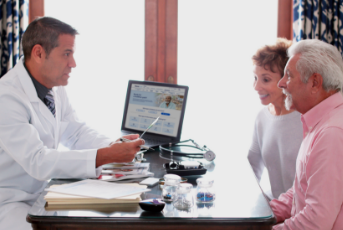
Testing for diabetes

The first step to diagnosis
If you and your health care provider suspect that you have diabetes, you’ll most likely get a blood test to be sure. There are several types of blood tests that can help your health care provider determine whether you have diabetes. These tests provide a snapshot of your plasma glucose, or blood sugar. These tests include:
Fasting plasma glucose (FPG)
These tests measure a person’s blood sugar after they haven’t eaten for 8 to 10 hours (or overnight). A diagnosis of diabetes is made when 2 fasting plasma glucose tests, taken on different days, are at least 126 mg/dL.
Oral glucose tolerance test (OGTT)
For this lab test, usually taken after an overnight fast, your blood glucose levels are measured before and 2 hours after drinking a liquid that contains glucose (sugar). If your plasma glucose is 200 mg/dL or higher, you may be diagnosed with diabetes.
Random plasma glucose test
With no fasting necessary, this is one of the easiest tests to see if you have diabetes. If you have common symptoms of high blood sugar, such as frequent urination, intense thirst, blurred vision, unexplained weight loss, feeling very tired, and you take a random blood sugar test that shows levels of 200 mg/dL or higher, you may be diagnosed with diabetes.
A1C test
The A1C test measures your estimated average blood sugar levels over the past 2 to 3 months. It’s like a “memory” of your blood sugar levels. An A1C test of 6.5% or higher can be used to diagnose diabetes.
Each diabetes test is different. Some tests tell your health care provider about how your blood sugar levels are doing for a short period of time, like the FPG, OGTT, and random plasma glucose test. Other tests, such as A1C, give your health care team the big picture of what your glucose levels are.
Coping with a diagnosis of diabetes
Finding out that you have diabetes can come as a shock. Fortunately, with effort and commitment, you can cope with the disappointment and stress you may feel by taking charge of your health and learning to manage your diabetes. It’s also important to remember you are not alone. Your diabetes care teamDiabetes care teamYour diabetes care team may include a primary care doctor, a diabetes and hormone doctor (endocrinologist), a registered nurse, a diabetes educator, a dietitian, a heart doctor (cardiologist), a foot doctor (podiatrist), an eye doctor (ophthalmologist/optometrist), a kidney doctor (nephrologist), a dentist, a pharmacist, and a mental health professional. will be there for you throughout your diabetes journey.
Remember, learning how to manage your diabetes will take time. The more you know, the more confident you’ll become. The important thing is to keep taking steps toward coping with the challenges in a healthy way. You can do this! Here is some good advice that may help.
Tracking your blood sugar
Keeping track of your blood glucose levels can help you manage your diabetes. Once you get into the habit, it will become just part of your daily routine. The good news is that you’ve got lots of help. There are digital tools and devices to help you monitor diabetes.
You may also like:
Taking care of your mental health
This infographic has some quick facts about mental health and tips for managing stress.
Managing the risk of long‑term problems
Now is the time to take action to help reduce the risk of long-term problems from diabetes.


